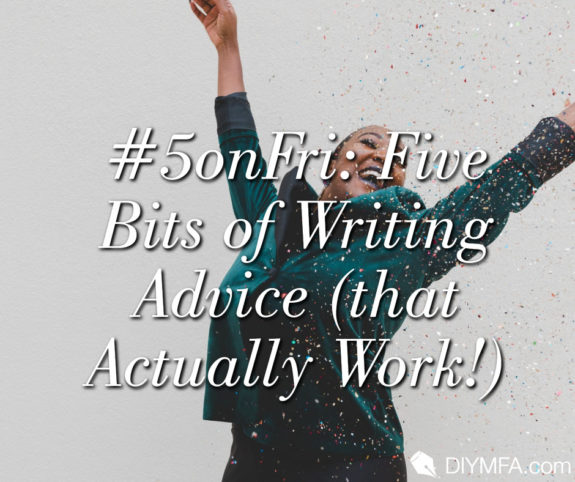As writers, I’m sure we’ve all heard our fair share of colorful writing advice from famous authors. From the controversial “Write drunk, edit sober” (frequently attributed to Ernest Hemingway, but actually sourced from a novel by Peter de Vries) to the unorthodox suggestion of “Get a cat” (one of my personal favorites, courtesy of Muriel Spark), these author-supplied writing tips are often amusing. Unfortunately, not all of them actually work.
In fact, it’s remarkably rare to stumble upon writing advice that’s neither too nebulous (“never give up!”) nor too unrealistically prescriptive (Stephen King may be able to write 2,000 words every single day, but most of us cannot). To that end, I want to share a few gems of genuinely useful, actionable writing tips I’ve picked up over the years: tips that have not only worked for the authors giving them, but which have also done wonders for me personally.
1. Start anywhere
This is one of the most popular pieces of writing advice out there — I suspect because many writers suffer from perfectionism, which can make starting each new piece incredibly difficult. I’m no stranger to this predicament: the pressure to get every word right from square one can feel insurmountable, especially when penning something as intricate as a book. Indeed, this is why so many authors spend months outlining to minimize mistakes down the line.
But sometimes, in the (paraphrased) words of Flaubert, you simply have to shut up and get on with it. Or take this actual quote from Hemingway, which puts it a bit more positively: “All you have to do is write one true sentence. Write the truest sentence that you know.” True, it must be noted, doesn’t always mean beautiful and profound, and it certainly doesn’t mean perfect.
If Hemingway doesn’t do it for you, one has to respect the pure pragmatism of this line from Jane Austen, from a letter to her sister Cassandra: “I am not at all in a humor for writing. I must write on until I am.” Even when you find it hard to write truthfully, begin anyway, and sooner or later you will arrive at the truth you wish to tell.
2. Get up early — or stay up late
When it comes to advice, there’s nothing like a clear, evidence-backed directive. This is one such tip: according to overwhelming testimony, if you want to become a successful author, you need to start getting up early. Or, if that doesn’t jibe with your Circadian rhythm (I’ll be honest — it never has for me), staying up late can produce a similar effect! In a nutshell, you must find a time in the day with no interruptions or impediments to your creativity.
My favorite source for this particular piece of writing advice is Ursula K. Le Guin, whose writing schedule recirculates on Twitter every so often just to remind us all what an icon she was. Still, even Le Guin couldn’t write at all hours of the day; by her own admission, after 8 pm she would become “very stupid and we won’t talk about this.” She consistently capitalized on those morning hours because she knew they were her most productive.
Toni Morrison, another famously early riser, nevertheless acknowledged that inspiration manifests differently for every writer. “Writers all devise ways to approach that place where they expect to make the contact, where they become the conduit, or where they engage in this mysterious process,” she said in one interview. “For me, light is the signal in the transition. It’s not being in the light, it’s being there before it arrives.” You don’t necessarily need to be up for first light — but whatever your own “golden hours” are as a writer, take advantage of them.
3. Record interesting things and don’t hoard details
This one’s a two-parter courtesy of Andrew Sean Greer and Annie Dillard. Lots of writers talk about taking details from the world around them, but few have done so to the extent of Greer, who revealed in a recent AMA that almost every bit of scenery from his Pulitzer Prize-winning novel Less came directly from real life: “One rule I had for Less was that every detail had to be something I wrote down in my notebook while traveling… I did not want to invent a ‘fantasy’ of a foreign country, but the real thing.”
As with Toni Morrison watching the sunrise every morning, you don’t need to be quite this rigorous to make use of Greer’s strategy. Simply start recording more facets of real life — if you don’t already have a dedicated details notebook (or page in the note-taking app of your phone), start one today and make an effort to add to it.
Not sure what this might look like? Another favorite anecdote of mine on the subject comes from Marina Keegan, author of The Opposite of Loneliness, who maintained a 32-page document of interesting things ranging from “descriptions of a waiter’s hand gestures, to my cab driver’s eyes, to strange things that happen to me or a way to phrase something.” Basically, anything and everything that draws your attention is fair game.
The only trouble with recording all these details is that you may not know when to use them. But according to Annie Dillard, any time could be the perfect time. “Do not hoard what seems good for a later place in the book, or for another book,” she urges in The Writing Life. “Give it, give it all, give it now.” This applies to other aspects of writing as well — winning turns of phrase, brilliant plot devices — but I’ve found it especially helpful in the context of real-life details.
4. Follow your protagonist’s lead
Every great series, novel, and even short story must be based in strong character motivations — otherwise, the story has no reason to exist. So if you’re struggling with the direction of your story, the best thing to do is zero in on your protagonist’s motivations. Or, as Ray Bradbury artfully put it: “Find out what your hero wants, then follow them.”
This is easier said than done. One thing I personally have trouble with is separating my characters’ goals and personalities from my own; I often find myself rereading a scene I’ve just proudly finished, only to find it’s completely inconsistent with a certain character because I’ve unconsciously projected my own desires onto the page. And while I do think it’s useful to relate to your main character in some ways, they need to be their own person (as much as a fictional figure can be) in order for them to go on an interesting, satisfying journey.
Hence the emphasis here is on following their lead (again, as much as you can with someone, well, fictional). To facilitate this, flesh out your main characters before you get the narrative underway. Fill in character profiles with questions like “How did their childhood shape who they are?” and “What would they do if someone they loved were in danger?” It might seem silly to answer questions that won’t even come up in your story, but it all contributes to a deeper understanding of how each character will perceive and react to everything that does.
5. Invest yourself emotionally
Other than “get a cat,” this is probably my favorite piece of writing advice ever — it’s by far the most powerful way I’ve found of getting other people invested in my work. And as you’d imagine, it also makes the creative process that much more enjoyable and exciting!
Robert Frost expressed the mutual benefits of this strategy quite succinctly: “No tears in the writer, no tears in the reader. No surprise in the writer, no surprise in the reader.” This doesn’t mean you’ll experience these emotions in the same way as your readers; indeed, the misfortune of being the author is that you can never truly catch yourself by surprise. Still, you should know when you’ve hit upon something good. Every “aha!” moment you have when planning your story will hopefully translate into a moment of narrative satisfaction for your readers.
That said, the trick here is not to become so emotionally invested that it hinders your writing. As I mentioned, this often happens to me when it comes to character motivation. It can also be challenging to detach yourself emotionally when it comes time to edit. But better to be too invested in the story, in my opinion, than not invested enough. (Susan Sontag would agree — she said, on the subject of starting a novel, “The story must strike a nerve in me. My heart should start pounding when I hear the first line in my head. I start trembling at the risk.”)
Of course, at this juncture, I feel obligated to return to one of my very first points: not every piece of writing advice is going to work for every author. But in my own experience — and in that of some of the best literary minds of the past two hundred years — these five tips are bound to set you on a strong path.

Savannah Cordova is a writer with Reedsy, a marketplace that connects authors and publishers with the world’s best editors, designers, and marketers. In her spare time, Savannah enjoys reading contemporary fiction and writing short stories.







